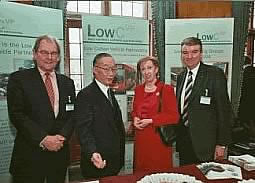| |
| Speech at Japan/UK Automotive Technology Forum on Low Carbon Vehicles |
2 December 2003
|
| Left to right: David Wallis, Ambassador Orita, Environment Minister Beckett, and Graham Smith |
 |
| |
|
Secretary Beckett, Mr Macgowan, Distinguished Guests, Ladies and Gentlemen,
Thank you, Mr. Macgowan, for your kind words of introduction.
First of all, I would like to express my gratitude to the UK government for taking the initiative in organising this Joint Japan-UK Forum on Automotive Technology. We have with us an impressive members of experts from both countries, representing both the public and private sectors, and it will be extremely interesting to hear what they are going to say.
As the 21st century unfolds, it is gratifying to note that the economic and business links between Japan and the UK are as strong, widespread and deeply-rooted as ever. This is an era in which both Japan and the UK are committed to fostering an environment conducive to mutually-beneficial investment and trade. The UK is the top European destination for Japanese direct investment and remains a very important business partner for Japan.
The automotive industry is a cornerstone of this thriving economic partnership, as can be observed in the success of the SMMT Industry Forum. The Japanese automotive sector considers the UK as an important manufacturing base for the European market. The three Japanese automotive giants Toyota, Nissan and Honda, who are represented here today, have been operating in the UK for more than a decade. And around 60 Japanese suppliers of automotive components are now operating here.
When Prime Minister Blair met Prime Minister Koizumi in Japan in July, it was agreed between the two leaders in the Joint Statement on Environmental Challenges that the UK would host a joint forum with a view to facilitating an exchange of information and to examining possible projects involving collaboration and joint investment in R&D into alternative vehicles and fuel sources. I believe that today's Forum will build on this agreement to help strengthen yet further our collaboration in the automotive sector.
Although many experts from both sides are waiting to address the specific issues faced by the automotive industry in depth, let me just make a few preliminary remarks about the current situation surrounding the industry.
It is just over a century since automobiles were invented. Their impact on the world in terms of improving living standards and promoting economic growth is clear for all to see. It is probably true to say that, for most of the people in this room, life without a car would be almost unimaginable.
However, with the rise of environmental problems such as air pollution, global warming and the exhaustion of energy resources, the automotive industry must now respond to some challenges that cannot be avoided. Some people are calling this the 'Century of the Environment', and it is a fact that automotive companies the world over are placing maximum importance on tackling and overcoming environmental and energy-related issues. Success in this endeavour is essential if we are to attain sustainable development.
To this end, Japan is making every effort to develop technology that will lead to cleaner, more fuel-efficient vehicle. The progress that has been made owes very much to the efforts of Japanese car manufacturing companies that are working to develop low emission vehicles such as hybrid vehicles. Meanwhile, the public sector is doing its part by providing support for these efforts by the private sector. This support takes such forms as subsidies and lower taxes for low emission vehicles.
Another example of our efforts to tackle environmental and energy issues can be found in fuel cell vehicles. Dubbed 'the vehicles of the next generation' or 'the ultimate vehicles', fuel cell vehicles seem to comprise the key to make it possible for modern transportation methods to coexist with the environment. Automotive manufacturers all around the world are now competing fiercely to develop fuel cell vehicles. Japan is no exception, and has indeed made significant steps in that direction. For instance, in order to have fuel cell vehicles available for practical use as soon as possible, we are testing them on public road tests in the metropolitan area.
I would also like to note that Prime Minister Koizumi is very keen to see fuel cell vehicles come into practical use. Last year, upon his instruction, these cars were adopted as official cars of various government ministries. In fact, today (2nd December) marks the first anniversary of that initiative. Furthermore, the entire Japanese government is now reviewing the relevant regulations thoroughly, and is also pressing for the construction of the necessary infrastructure to support the hydrogen energy society of the future.
Today, these advances in Japan will be explained in greater depth in the presentations to follow by experts from our government as well as car manufacturers. I hope this forum will promote strategic partnerships between British technology providers and Japanese vehicle manufacturers, and that it will contribute to raising the competitiveness of the automotive industries of both countries in an environmentally-friendly way. The deep friendship between our two countries demands no less.
Thank you. |
| |
| Top |
|
|


